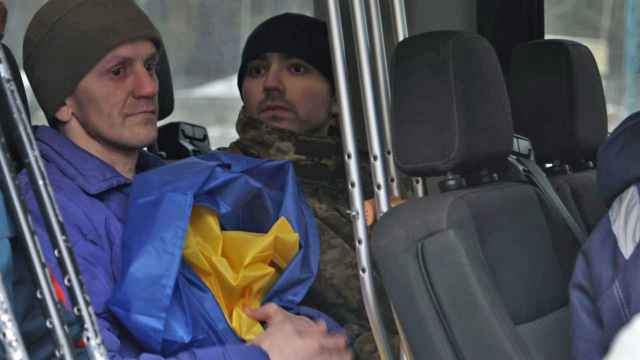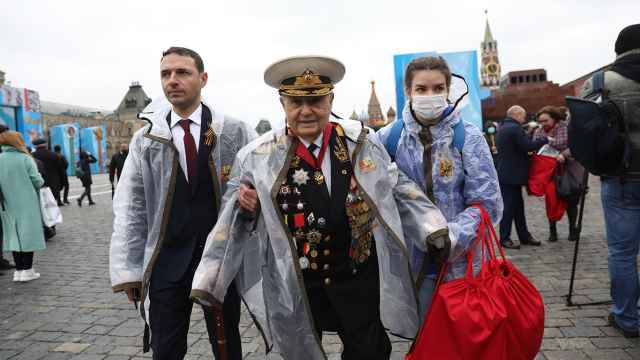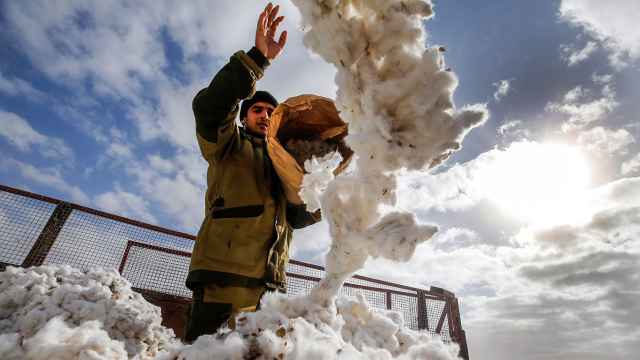LONDON — Unlike previous voting cycles, foreign investors are bored with political developments in the run-up to Russia's parliamentary and presidential elections, according to a group of leading investment bankers.
Top executives from UralSib Capital, the investment banking arm of UralSib Financial Corporation, said last week that there was a lack of concern among investors over who occupies which top government post.
"The number of people who are interested in this is becoming fewer and fewer," Maxim Shashenkov, managing director and head of international sales for UralSib Capital, said at a meeting with reporters in London.
"In 2005 or 2007, people were very interested in politics in Russia, and there were always questions about it. But now foreign investors understand how everything works."
Prime Minister Vladimir Putin announced on Sept. 24 that he would seek a return to the presidency in elections next year. President Dmitry Medvedev is expected to become prime minister.
"The basic story that is sold about Russia is a story of political stability," said Mark Temkin, head of investment banking at UralSib.
The news that Putin and Medvedev simply intend to switch positions in 2012 — a move that opens the door for Putin to become the longest-serving Russian leader since Josef Stalin — did not provoke a reaction on either of Moscow's bourses.
More surprisingly, and contrary to the predictions of many analysts, the departure of Finance Minister Alexei Kudrin just 48 hours after the ruling tandem announced their intentions also failed to trigger any market response.
Though Kudrin had been held in high regard by foreign investors for his fiscal conservatism and tight budgetary discipline, Russia's MICEX Index climbed 2.5 percent on Sept. 27, the day after his public spat with Medvedev and exit from front-line politics.
Questions about Kremlin power struggles are only posed by "investors who are quite a long way from Russia and not very engaged in investment," said Konstantin Chernyshev, head of research at UralSib Capital.
A growing awareness that dramatic change is not in the cards could have a positive impact. Russia currently trades at a discount to other BRIC countries, Shashenkov said, and the perception that political risk is receding might lessen the discount gap.
Putin has made a point of stressing political and economic stability at set piece meetings with foreign investors since the announcement that he will return to the presidency.
Much more important than second-guessing the Kremlin for foreign investors, however, is the impact of the global economic situation on Russia, the UralSib bankers said. Putin has promised that GDP growth will reach four percent in 2011 and quickly return to 6 or 7 percent.
But UralSib has forecasted that in an international scenario of slow growth, the Russian economy will only expand 3.7 percent next year — and if the world enters a deep recession and oil prices fall below $40 a barrel, the Russian economy will contract 5.6 percent.
Speaking as a part of a three-day UralSib conference taking place in Stockholm, Geneva and London, Temkin warned that the current crisis was completely different to that of 2008 when, despite the signs of approaching crisis, people remained fatally optimistic. Today's wrangling over European sovereign debt was "a crisis of belief in the future," he said.
Oleg Vorotnitsky, head of equity at UralSib, said initial public offerings by Russian companies in London were unlikely to take place before the end of this year, but might pick up again in 2012. "Greed is a tremendous force," he said.
Seeking to raise about $30 billion, dozens of Russian companies planned IPOs in 2011, but unfavorable market conditions confounded predictions of a successful year. Only four of the 10 companies that attempted to float in the first five months of the year completed their listings.
Despite macroeconomic difficulties, investment banking head Temkin admitted that 2011 had not been a bad year for UralSib itself. Unlike some investment banks that are cutting staff, UralSib announced last week that it was hiring bankers from TKB Capital.
"A crisis is a problem and a risk, but it is also an opportunity," he said.
The UralSib investor conference culminated in a concert at London's Royal Albert Hall by pop crooner George Michael. The evening's program included a cover version of Rihanna's "Russian Roulette."
A Message from The Moscow Times:
Dear readers,
We are facing unprecedented challenges. Russia's Prosecutor General's Office has designated The Moscow Times as an "undesirable" organization, criminalizing our work and putting our staff at risk of prosecution. This follows our earlier unjust labeling as a "foreign agent."
These actions are direct attempts to silence independent journalism in Russia. The authorities claim our work "discredits the decisions of the Russian leadership." We see things differently: we strive to provide accurate, unbiased reporting on Russia.
We, the journalists of The Moscow Times, refuse to be silenced. But to continue our work, we need your help.
Your support, no matter how small, makes a world of difference. If you can, please support us monthly starting from just $2. It's quick to set up, and every contribution makes a significant impact.
By supporting The Moscow Times, you're defending open, independent journalism in the face of repression. Thank you for standing with us.
Remind me later.






